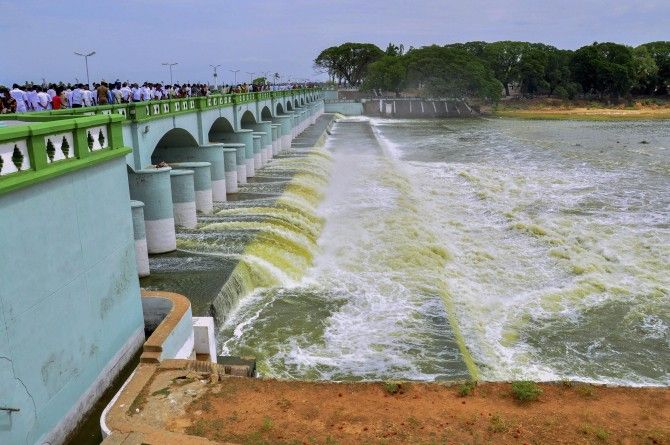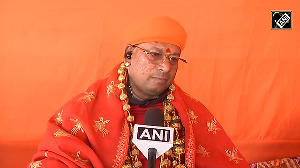'Sharing of water from a river which flows through several states is a crucial challenge which comes in the way of maintaining the spirit of good neighbourly relations.'

IMAGE: The Cauvery flows into the Kallanai dam in Tiruchirapalli district, Tamil Nadu. Photograph: PTI Photo
S Janakarajan -- former professor at the Madras Institute of Development Studies and now president, SaciWATER -- is the mastermind behind the formation of the Cauvery Family in 2003 where farmers from Karnataka and Tamil Nadu came together to find a solution to the Cauvery waters dispute.
"If rivers are nationalised, there is a danger that the party ruling at the Centre may use it as a political tool," Professor Janakarajan tells Rediff.com's Shobha Warrier.
As a person who has been closely involved with the Cauvery water dispute, how do you analyse the Supreme Court judgment?
The 'numbers' (177.25) do not trouble me much although the reduction seems to be somewhat unfounded.
In some sense, these numbers are irrelevant, like if water doesn't flow through the downstream when water is most needed in Tamil Nadu.
Therefore, what is really important is to ensure that the allocated water in the final verdict flows through the downstream of the Cauvery river as per the monthly schedule prescribed in the tribunal.
The most crucial months for Tamil Nadu are June to September and January and February.
The major change pronounced by the three-judge bench led by Chief Justice Dipak Misra from the 2007 Cauvery Water Disputes Tribunal order was asking Karnataka to release to Tamil Nadu 177.25 tmcft of water as opposed to the earlier 192 tmcft.
Is it justifiable, according to you?
You should go a little further up into the past: The interim award of the tribunal allocated 205 tmc feet of water to Tamil Nadu which was reduced to 192 tmc in the final award which is further slashed down to 177.25 tmc feet in the final verdict of the Supreme Court.
The cutting down of Tamil Nadu's share is seemingly disappointing, but is there a mechanism which will ensure the release of water to Tamil Nadu without any hitches?
The most worrying issue for me as an environmentalist is the way the perennial river is reduced to a seasonal river, that too with lots of uncertainties.
Its ecological implications are hugely adverse, in particular for the delta districts and for the coastal ecosystem.
The judgment said, 'The waters of an inter-state river passing through the corridors of the riparian states constitute national assets and cannot be said to be located in any one state.'
'Being in a state of flow, no state can claim exclusive ownership of such waters or assert a prescriptive right so as to deprive the other states of their equitable share.'
Is it a landmark as far as water disputes go?
I do not think it is in any way a landmark judgment.
For me, this is common sense. How can any state own a river?
A river and its riverine ecosystem become full of life only if there is flow of water.
Otherwise, we cannot call it a river and it would just be barren land.
Nevertheless, it is good that the Supreme Court used terminologies like 'No state can ever claim exclusive ownership of rivers'.
Furthermore, during heavy rainfall years, the flood water has to flow through the downstream as otherwise it is not only difficult to withhold all the water in the upstream, but it will also result in severe flood havoc.
This is what the upper riparian state should realise: Whether high or low rainfall years, whether flood or drought, all riparian states should share them equitably for not only protecting the livelihoods of millions of farmers, but also to protect the biodiversity and the riverine ecosystem.
While the Opposition parties in Tamil Nadu expressed disappointment, Ayyakannu, the Tamil Nadu head of the Desiya Thennindhiya Nadhigal Inaippu Vivasaayigal Sangam, said he was happy and satisfied.
According to him, the formation of the Cauvery Management Board could make a lot of changes in the current scenario. Do you feel so?
As I said earlier, the 'numbers' do not trouble me much.
What is most important is to ensure that the allocated water flows through the downstream as prescribed in the tribunal.
In order to guarantee this flow, the constitution of the Cauvery Management Board is extremely important which should have a representative as appointed by the Supreme Court (as a law expert), and a few subject experts (on water, agriculture, ecology etc) representing both Tamil Nadu and Karnataka.
Most important, once the CMB is constituted, the state government should hand over the responsibility of opening up of reservoirs to the CMB for downstream users.
What can be a permanent solution to the water-sharing disputes between states?
If one goes by law, the constitution of the CMB and implementing strictly what is indicated in the final verdict should end this bitterest dispute.
But what is most important is to maintain good neighbourly relations with all states within a country.
One should respect the principles of federalism in a vast and diverse democratic country such as India.
Sharing of water from a river which flows through several states is just one but a crucial challenge which comes in the way of maintaining the spirit of good neighbourly relations and the principles of federalism.
All states should realise that the spirit of the unity of a nation is overbearing than anything else.

You said earlier that interlinking of rivers is a very bad idea. People are talking about it again, after the Supreme Court judgment.
Interlinking of rivers cannot be the solution for ending inter-state water disputes.
Demand for water is literally escalating in all the river basins in the country.
In the case of the peninsular river link, the most important surplus rivers conceived earlier were Mahanadhi and Krishna.
Please go and check with states such as Odisha and Chhhattisgarh (for the Mahanadhi) and states such as Maharashtra, Andhra Pradesh and Telangana (for the Krishna river).
They are already in dispute with each other in sharing the river waters. Hence, where is the question of getting surplus from these rivers to the Cauvery?
Furthermore, it will result in huge ecological imbalances in the respective riverine ecosystems.
To me, the river linking project is a myth, quite far away from reality.
Should rivers be nationalised?
The Supreme Court has already indicated that no riparian state can ever claim an exclusive right over any river.
If this is followed in the spirit of the law and letter, there is no need for any promulgation on the nationalisation of rivers.
If rivers are nationalised by a promulgation of law, there is a danger that the party ruling at the Centre may use it as a political tool.
Do you think disputes over water will continue since water will be scarce every day?
Yes, as demand for water increases across users and uses, I certainly see increasing water conflicts in the future.
Agriculture is no more the sole user of water as it used to be the case three or four decades ago. There is escalating competing demand for water across sectors such as agriculture, industry and domestic/urban uses.
In order to contain these water conflicts, we should concentrate more on water conservation techniques, rainwater harvesting in order to improve groundwater storage, modern water saving irrigation methods and so on.
Most important, domestic sewage and industrial effluent should be treated and recycled so that we attain what is called zero liquid discharge.
Those who cause pollution to the water bodies and rivers should be severely punished according to the law. But this is only my normative concern.
Most of the rivers in the country are severely polluted. The central and state pollution control boards, which are supposed to control pollution, simply remain mute spectators.
India is one of the countries which can boast of having very strong laws to protect the environment. But since the law enforcement and monitoring mechanisms are very weak, the pollution load in the rivers have been cumulatively increasing.
The Cauvery and its tributaries Noyyal, Amaravathi, Bhavani and Kodaganar (all in Tamil Nadu) and Arkavathi (in Karnataka) are all very heavily polluted. Therefore, it is extremely vital to look at the Cauvery river beyond inter-state water disputes.











 © 2025
© 2025